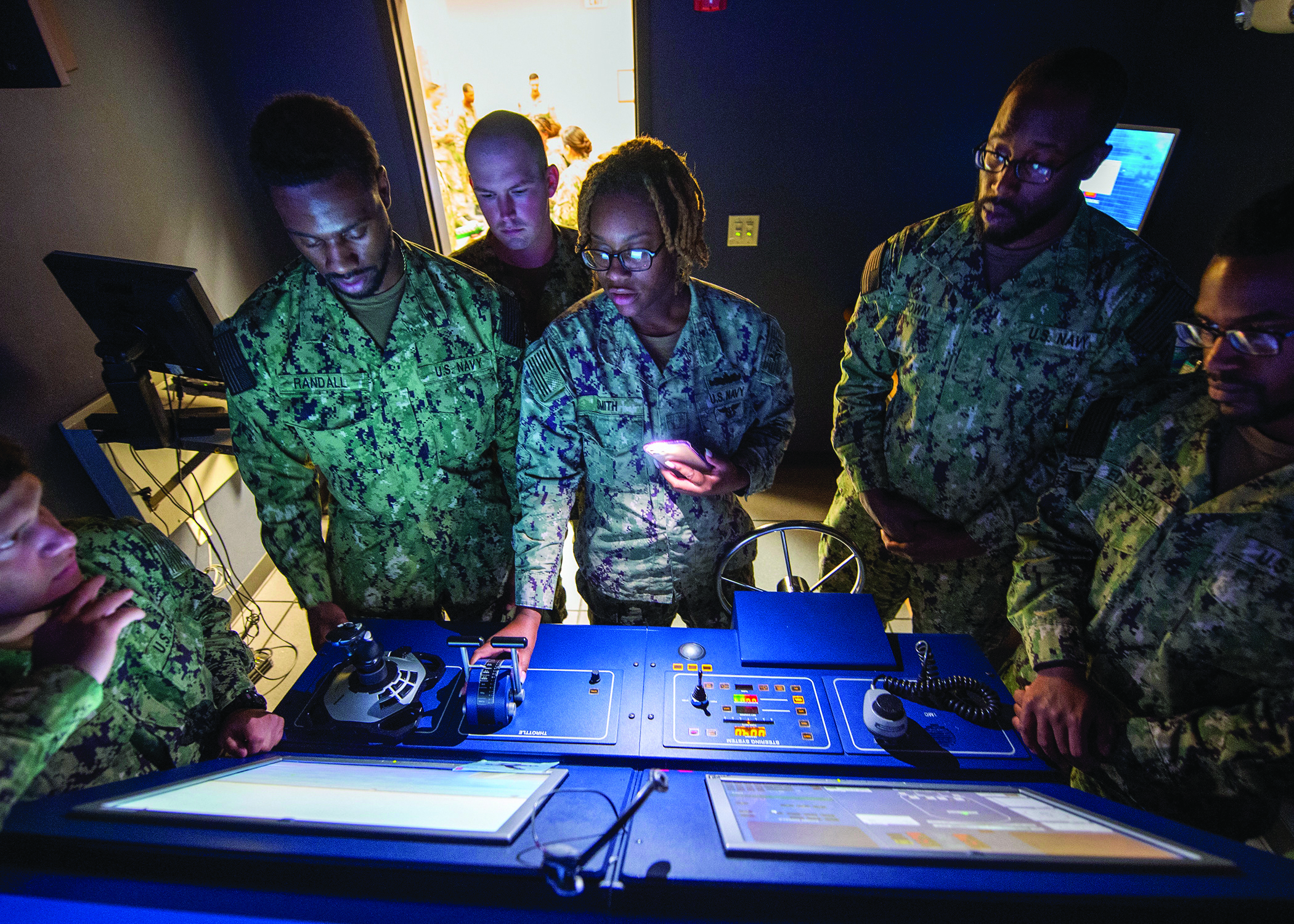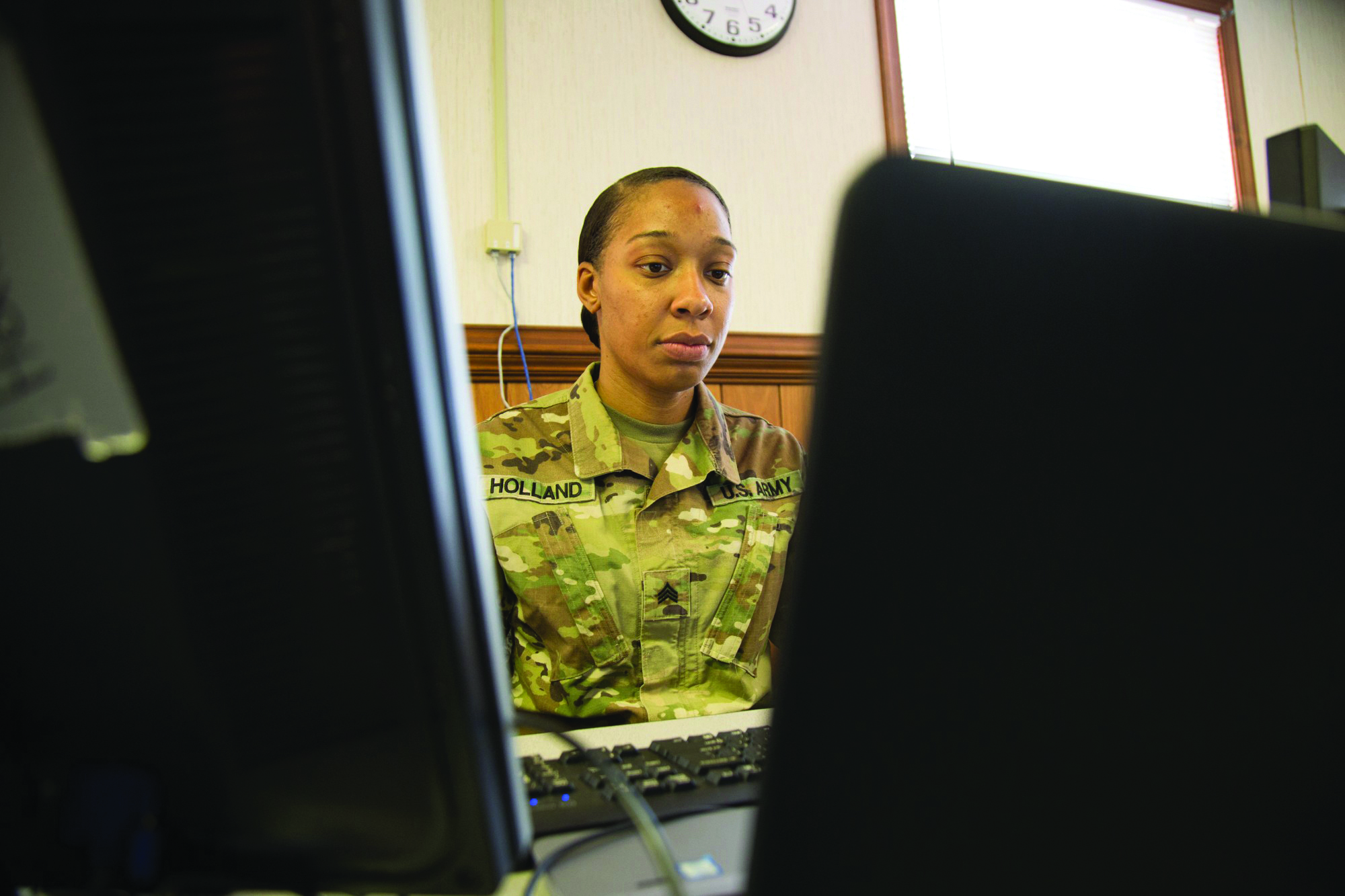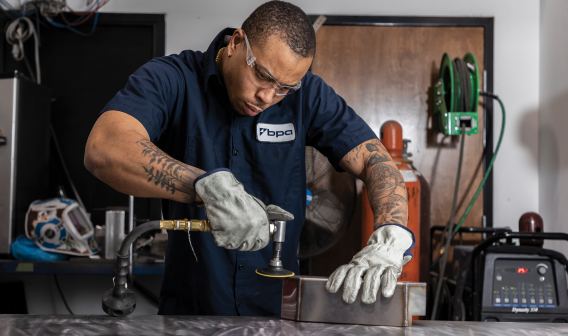Veterans Bring Adaptability, Clearances to Virginia Workforce

Only California and Texas boast more active duty and reserve personnel than the nearly 150,000 service members stationed in Virginia, including these Navy sailors on the USS John F. Kennedy, an aircraft carrier being constructed by HII, expected by 2025.
With 30 military bases, Virginia is among the states with the highest share of active duty troops relative to state residents. As those service members prepare to transition into civilian life, employers across Virginia stand to benefit from the wealth of skills these individuals gained through service, as well as state resources that connect employers with a talent pipeline equipped to serve in private sector roles.
“[Veterans are] one of the most dynamic and sometimes underutilized talent markets out there today. They bring a series of skills that you’re just not going to find in the civilian job seeker market,” said Michael Glascock, Northern Virginia employer liaison for the Virginia Department of Veterans Services (DVS).
Regardless of their technical expertise, veterans tend to bring to civilian employment an aptitude for leadership, an ability to work well in teams, and a history of adaptability.
“Whether it’s the veteran with an order from their commanding officer to ‘figure it out’ or military spouses who’ve had to pack up the family and move multiple times across the world, veterans and military families bring to work an ability to get thrown into the fire and just make it work,” said Brennan O’Boyle, a career services adviser for Deloitte’s ample military community.
Vetting the Vets
In many cases, these veterans may also bring with them security clearances. These clearances have proven to be in high demand among private employers, particularly the more than 18,000 defense contractors operating in Virginia. “It’s absolutely invaluable,” said Juan Garcia, managing director for Deloitte Consulting LLP.
Garcia served as an assistant secretary of the Navy in 2016, when a military contractor with access to the Naval Sea Systems Command headquarters killed 12 people at the Washington Navy Yard.
“That incident led to a very self-conscious evaluation about the clearance process,” Garcia said. “It slowed it down, and it continues to be a backlog. It’s understandably more difficult to get clearance than when that individual was able to walk into the Navy Yard. So, clearances are rarer — and more valuable.”
When candidates hold active security clearances, Deloitte is able to place those employees directly on projects within its Government and Public Services division. “I would say more than half of the projects in that space require clearance,” Garcia said.
Ed Dupass, the Northern veteran employment regional manager for Virginia Works, agrees that security clearances are a strength for transitioning service members. However, he cautioned, “There are a lot of misconceptions when it comes to security clearance. For a lot of individuals transitioning out of the military, there’s only a short period of time before that clearance goes basically inert. Companies need to think instead about an employee being clearable.”
Matching Candidate With Career
That said, Virginia Works’ veteran employment specialists — who are tasked by the Virginia Department of Workforce Development and Advancement to prepare veterans for the next phase of their careers — aim to match cleared candidates with employment opportunities as rapidly as possible.
The state program also works to ensure veterans hold the skill sets needed to thrive in a civilian career. As Dupass points out, what employers truly want is “a qualified person.” This is where Virginia’s wealth of workforce development programs proves invaluable for candidates and employers alike.
“A lot of employers fail to look at the resources right in front of them,” Dupass said. “Indeed and Monster are great tools, but how many employers understand that the Virginia Workforce Connection does all the same things? They just have to go in and utilize it.”
Virginia Works serves as a specialist that helps employers understand how veterans’ unique skill sets can be applied to open jobs. Veteran employment representatives in each region help businesses “decipher the military lingo,” as Dupass explains. He said, “We can help train their personnel to recognize and understand a lot of the gray area between a military résumé and a civilian résumé.”
Dupass has firsthand experience in how military lingo can be lost in its translation to the corporate world. Upon leaving the military as a reenlistment recruiter, it wasn’t until Dupass landed his first corporate role that he realized he held the same experience and skill sets as a senior human resources professional.
“I went from being a recruiter to an operations manager, managing six contracts across the United States,” Dupass said. “But my employer didn’t understand what they were getting when they hired me. I had to get in the door first. Now, we have people who can bridge that gap.”

Fort Barfoot
A Resources for Companies
Virginia Works partners with agencies across Virginia, including DVS. Through its Virginia Values Veterans (V3) program, DVS connects employers with professionals who can help them leverage state resources from recruitment through hiring and retention. Companies earn access to many of these resources through V3 certification, which demonstrates these employers are veteran- and military family-friendly.
“In Northern Virginia, we do work with a lot of defense contractors, both large and small, from tech startups looking to get into cybersecurity all the way up through global leaders like Booz Allen Hamilton and Leidos. But we can and will certify any type of employer looking to broaden the scope of their employees,” Glascock said. “We’re looking into manufacturing, skilled trades, local government entities, and more.”
V3 also provides transitioning service members and their spouses with peer-to-peer support that helps veterans address specific employment needs. This might include referrals to partners who can provide résumé reviews, interview training, and introductions to V3-certified companies. The result of this multi-pronged approach is that veterans have the precise skills needed to serve employers building a talent pipeline.
A Valuable Audition
While Deloitte has its own powerful veteran recruitment and training programs — including Career Opportunity Redefinition Exploration programs available to any transitioning service member and other employees — the firm also makes use of state and federal recruitment resources. Garcia has found that a location in Northern Virginia helps amplify the impact of participation within programs such as the U.S. Chamber of Commerce Foundation’s Hiring Our Heroes SkillBridge platform.
The program provides a 12-week audition for both candidates and employers. “The service member gets a good look at our firm, our culture, and work — and the chance to determine whether this resonates with them — and we get the same,” Garcia said. Due to Deloitte’s heavy presence in Northern Virginia, Hiring Our Heroes has connected the company with numerous individuals transitioning from the Pentagon.
“It’s competitive to get Pentagon duty when your kids are in high school, because people want to take advantage of these great Virginia feeder schools,” Garcia said.
As Garcia puts it, the same resources that make Virginia an ideal location for employers are the ones that keep veterans local after discharge.











